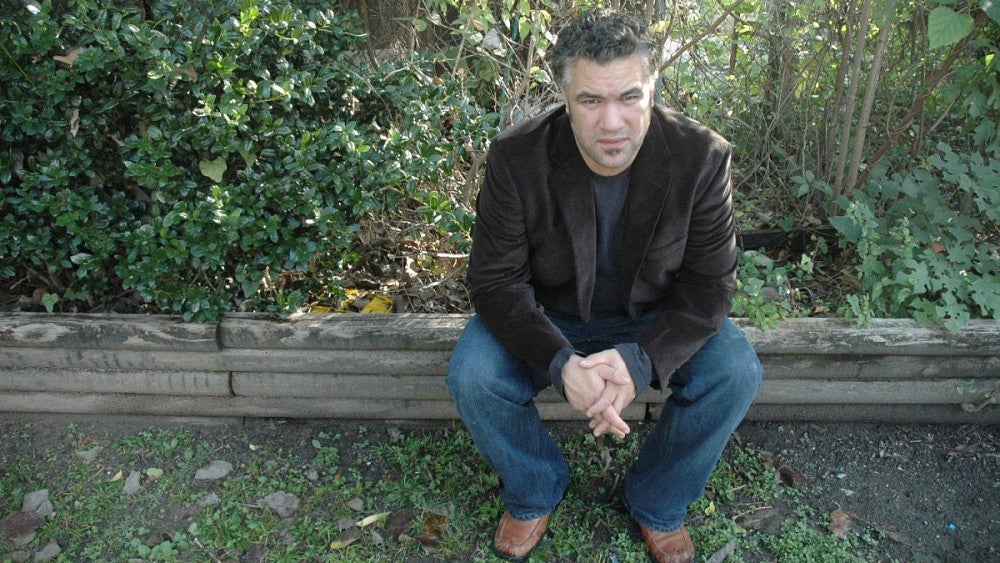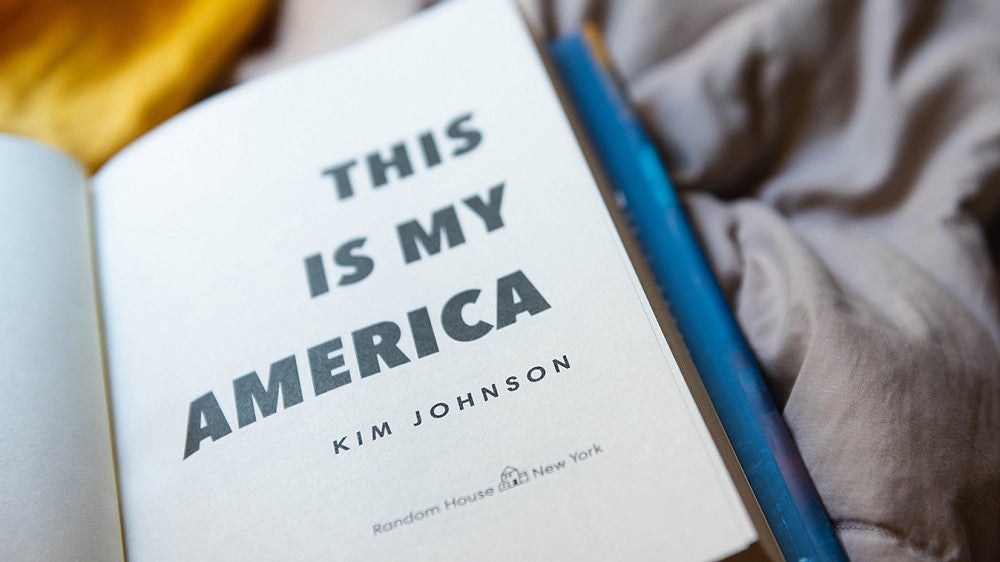
As the Kidd creative writing workshops turn 30, a poet reflects on a year in the program
RELATED LINKS
Launched in 1991, the Walter and Nancy Kidd Creative Writing Workshops offer University of Oregon undergraduates an intensive, yearlong immersion in poetry and fiction writing. The program attracts participants from all majors and provides a rigorous and supportive community for those interested in the craft of writing and close reading of literature.
Classes are limited to 10 students. Over the course of the year, participants workshop their writing with peers, learn to read like writers, and attend lectures by UO creative writing faculty members and distinguished authors who visit as part of the creative writing program’s annual reading series. There are no prerequisites to apply and students eligible for financial aid receive scholarship support from the Walter and Nancy Kidd endowment (awards range up to $3,000 annually).
The Kidd Workshops were envisioned and designed by creative writing professor Garrett Hongo. Led by graduate student instructors, the workshops are a cornerstone of UO’s highly regarded MFA program in creative writing, which admits only 2 percent of applicants each year.
Andi Butts, an English major and junior in the poetry track, captured a year in the program in four essays for Oregon Quarterly.

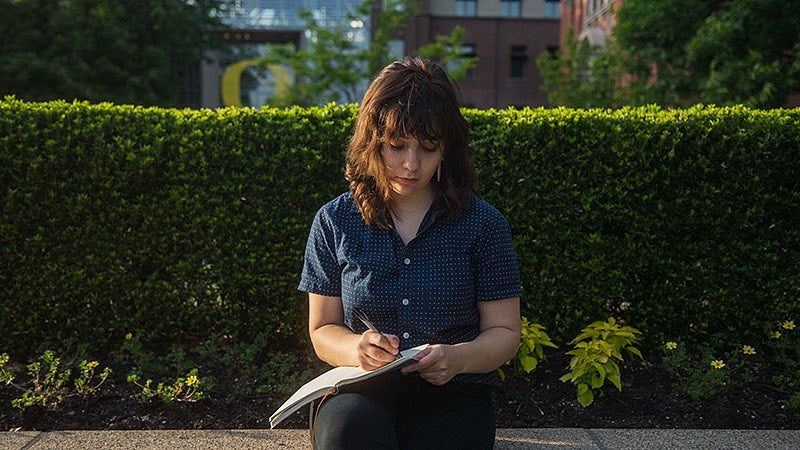
“Shredded” by Friends (and better for it)
Creative writing is difficult, and needless to say, when you add a pandemic to the mix, it becomes even more of a challenge. There’s no doubt that class is much different over a computer screen than it is in person, and no amount of skilled writing or nuanced critique can prevent the many difficulties inherent to doing school by Zoom. Some days, technical issues seem to arrive in abundance, turning even the most basic class activities—such as reciting our original work to one another—into tasks that necessitate repetition. “Your audio cut out,” “You froze,” or the classic “WE CAN’T HEAR YOU” have become the most commonplace of statements, made by students and instructors through both chuckles and groans. And still, none of this detracted from the Kidd workshops’ impact on my growth as a student of literature and a writer.
Workshops are the Kidd’s heart. During workshop, we present our writing aloud to our classmates, who then offer us feedback on what we can do to improve it. When a piece of mine is “up for workshop,” I prepare ahead of time to have it torn to shreds. (I have learned that entering workshop expecting to have my ego coddled is the best way to leave it ready to quit writing.) On one particular workshop day, I presented a poem that I believed in my heart of hearts to be one of my best. It combined some of my favorite poetic elements, including an extended metaphor, visceral imagery, and a fervent tone. But when I read the poem to the class, I was met with a sea of perplexed faces on my computer screen, followed by questions about the metaphor and various critiques about some of the other questionable technical choices.
My peers’ scrutiny stung. I hadn’t anticipated it. Instead of allowing myself to sink into shame, I paused, took a deep breath, and reminded myself, this is only going to help me. I thanked my classmates for their responses, stepped away from the poem for a couple of weeks, and then revisited it, ready, at last, to apply the ideas my peers had offered me. My writing is all the better for it.
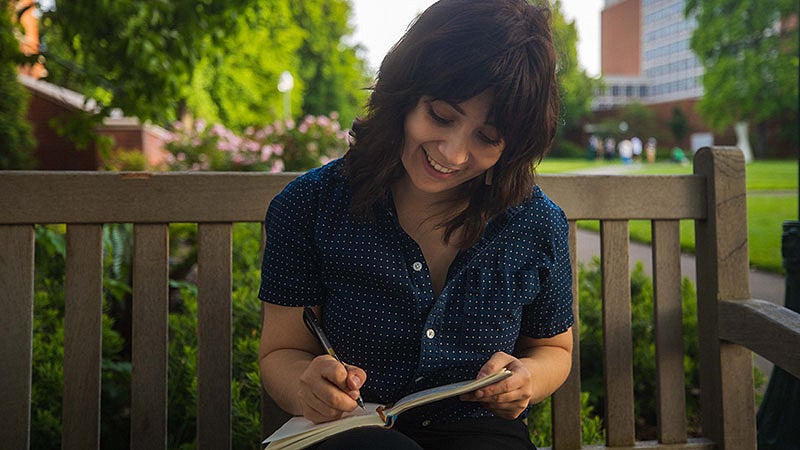
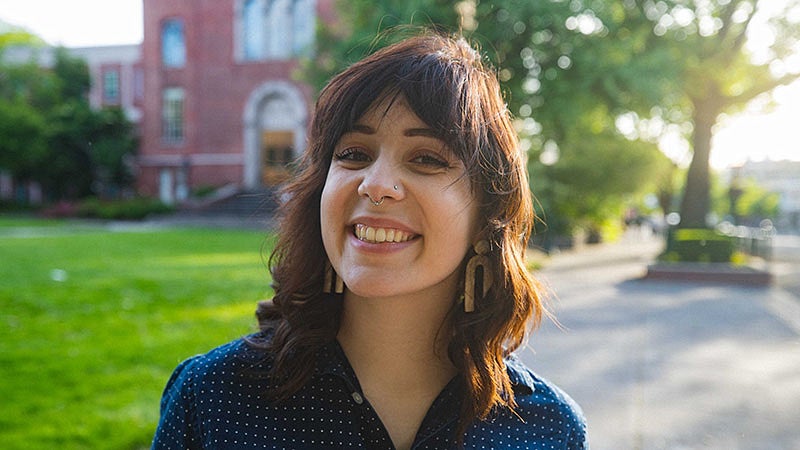
“Do Whatever Works”
Eminent writers and faculty members shed light on their work during craft talks, another critical component of the Kidd workshops. New-York-based poet Juliana Gray—whose collection, Honeymoon Palsy, was one of my favorite reads of 2020—provided my favorite craft talk of the year. Gray’s biting and infectious wit engaged me from the get-go, in spite of the fact that I had been cooped up in my bedroom for weeks on end, down with a case of COVID-19. More importantly, Gray offered a great deal of worthwhile advice for writers of fiction and poetry alike, the most notable of these being, “Do whatever works.”
“Do whatever works,” a phrase that, at the time, seemed to be vague beyond measure, was one that Gray said in the context of a larger discussion about balancing the specific with the general. At first, I found this piece of advice frustrating. Gray spoke of the importance of being precise, but her advice to “do whatever works” seemed to abandon precision altogether. What am I supposed to do with that? I wondered. But as I kept listening, I realized how often I am so focused on meeting certain criteria in my poetry—such as making sure that my diction and tone are consistent or including enough concrete details throughout (but not too many!), or fleshing out the speaker—that I forget to notice the big picture. For me, doing “whatever works” means asking myself what the poem is trying to do, and then doing it. It means not losing sight of my voice and intuition for the sake of making the “correct” choices in technique. It means attending to the balance of the specific and general by seeing the poem in its entirety, rather than as different, distinct parts.
Gray’s advice, though almost deceivingly straightforward, has encouraged me to trust myself; because of this, my poetry has been transformed.

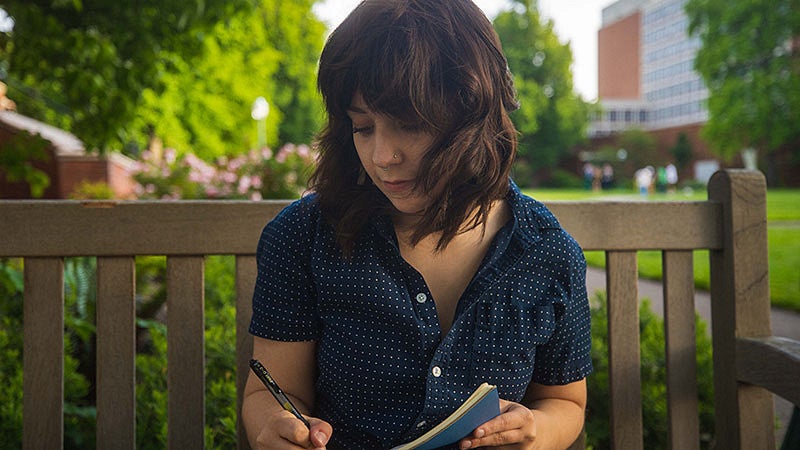
Line of Inquiry
The line of inquiry (LOI), a 12- to 15-page paper that we develop over the course of the year, is the most demanding part of the Kidd workshops. As an analytical person by nature and a self-professed English literature nerd, I also find the LOI to be the most thrilling. In this paper, we are free to explore whatever topic interests us, so long as it is related to craft. During fall term, we begin to narrow the focus of our exploration, gathering sources—poetry or fiction and craft essays—related to our chosen subject. Winter term is dedicated to examining these sources in depth and creating an annotated bibliography. At last, during spring term, we write essays, our LOIs, based on our research, the findings of which we present to our peers.
My LOI centers on modern female poets’ works about abuse and trauma. I analyze the technical choices that these poets made to render trauma in their work and argue through a feminist lens that writing about these subjects is an act of resistance and necessity.
The topic of my LOI, in and of itself, did not emerge out of thin air; it was developed and refined over the course of many months. Researching and analyzing this topic in depth has made me mindful of the extent to which sociocultural norms and beliefs inform—and are informed by—art and people’s values within it. This is most apparent to me in my own life. I have examined and reexamined the teachings I’ve absorbed—from professors and others—about what is and isn’t valuable in poetry and creative writing, more generally. I’m more willing to come to my own conclusions about what makes writing “good.” I feel more excited to write, more in touch with my true values in art. Writing the LOI was an immense undertaking, but I have learned more about my writing through it than through any other part of the Kidd. For that, I am genuinely thankful.
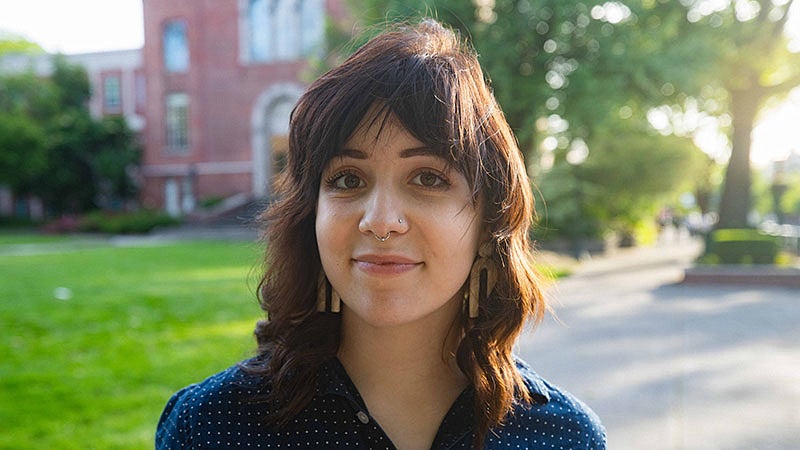
An Emerging Voice
I entered the Kidd workshops with a few other creative writing classes under my belt, but none that demanded the same speed, rigor, and imagination that the Kidd program asked of its students. I was adept at constructive criticism, though I was better at pointing out what wasn’t working in a piece of writing than what was. Coming up with ideas, and the language to express them, was a challenge at best, and I paid little attention to devices like meter and form. I was unsure of my poetic voice, fixated on how my writing stacked up against that of my peers and aiming for perfection, which came at the expense of my authenticity.
Thanks to the workshops, my understanding of craft and technique has reached a height I did not foresee. This has deepened not only my grasp on poetry but my love for it, too. My imagination has expanded; ideas seem to bubble up in an endless supply, and I now have more tools to bring them to light. Perhaps most importantly, I am beginning to develop my poetic voice, which has helped me feel more connected to and confident in my writing. I spend less time comparing myself to my peers and more time learning from them, recognizing the privilege it is to be a part of a group filled with so many talented, intelligent, and encouraging people, many of whom have become my friends.
I applied to be a part of the Kidd workshops not because of a passion for technique but because poetry moves me. It has moved me since I discovered it as a sensitive 13-year-old, struggling to feel at home in the world around me, and it will continue to move me as I—and my writing—grow and change.
Creative writing is not an aimless, impractical endeavor; it allows us—whether we are the writer or the reader—to make sense of the events in our lives. It is the avenue by which we can notice the world around us, often in unexpected and, at times, beautiful ways. We need this now more than ever.
Poems by Andi Butts
This is about pansies.
(If you wish.)
This is about diligence and instinct
and the next second’s
tether on us all. This
is about moving toward
some faraway light
in some faraway splash of space
upon catching
cracked
like bathroom-mirror glass
from the sun of summers passed; about becoming
unshelled and undone for an-
other, facing the faroff light crying,
And yet.
No-
thing is immutable.
You and I
and every pansy underway
are no more concretized in time
than any other thing
that has since wilted
or crumbled
or dwindled to dirt, to dust,
becoming the earth underneath us.
Dust
I stare up at my bedroom ceiling—
bone white and chipped in one place—
and watch dust dangle like tiny ghosts
in the static afternoon air,
shifting about in a slow stir,
headed nowhere.
It should be quiet here—
the drone of the box fan in the corner,
the occasional inhalation
when I remember to breathe—
though it hardly ever is.
There is too much time to think.
At dusk,
dust looming overhead,
I am a cadaver on an exam table,
autopsied by the men in my imagination
who have returned to see me dead, frozen
in bed. One by one,
they take what they want from me,
dissecting my corpse limb to limb,
turning me, now turned out, into hollowed-out skin,
just as before.
I choke
on air, and my heart hammers
against my chest
as if attempting escape. Here,
I become who I have been
for six, seven years now—
a bug-eyed, gasping thing, trapped
in its own memory.
Soon enough though,
my heart falls back
into its usual numbed pace—
soon enough,
I am no longer swallowing air
like I am starved of it,
at least for a night or two.
It is too dark to see the dust, but I know
it is there, still looming,
coating the room, little by little,
in a film of gray.
Know Me
My Athena, I know why you have done this,
why you have made a monster of me—
my hair now skeletal and scaled, scouring the air
in search of fools who stare,
sibilating
a warning.
But how it would stiffen
and hush in your midst; how my blood,
though disparate from that
of the woman I once was,
still roils
at the thought of you.
Poseidon took from me the thing for which
you most longed—I know this is the truth of it.
I know that when you looked at me,
you felt, for once, unwise,
that you may come undone like an unstable fresh clay pot
collapsing mid-revolution.
My vow to abstain—broken by a force
not my own—was not the cause of your fury,
your vengeance, no. It was
the tie between us, which Poseidon frayed
and left ragged, unraveling
thread by thread.
If you must remember anything, let it be this:
though you have transformed me into terror,
you, my immortal one,
withstand petrification.
Remember how my hair used to shimmer in sunlight.
Remember how you once saw me and know
that I, as monstrous as I now may be,
will wait for you to know me.



